

What Is the Integral Approach? Types simply refers to items that can be present at virtually any stage or state.
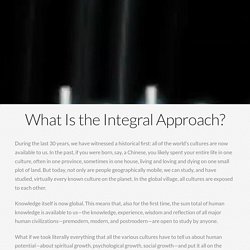
One common typology, for example, is the Myers-Briggs (whose main types are feeling, thinking, sensing, and intuiting). You can be any of those types at virtually any stage of development. These kind of “horizontal typologies” can be very useful, especially when combined with levels, lines, and states. To show what is involved, we can use “masculine” and “feminine.” Carol Gilligan, in her enormously influential book In a Different Voice, pointed out that both men and women tend to develop through 3 or 4 major levels or stages of moral development. Gilligan found that stage 1 is a morality centered entirely on “me” (hence this preconventional stage or level is also called egocentric). Well, before we look at the important conclusion of Gilligan’s work, let’s first note her major contribution. In a different voice. So, integrated or stage 4—what is that?
That’s the crucial point. Integral Glossary. Integral theory. Integral theory, a philosophy with origins in the work of Sri Aurobindo and Jean Gebser, and promoted by Ken Wilber, seeks a synthesis of the best of pre-modern, modern, and postmodern reality.[1] It is portrayed as a "theory of everything,"[2] and offers an approach "to draw together an already existing number of separate paradigms into an interrelated network of approaches that are mutually enriching.
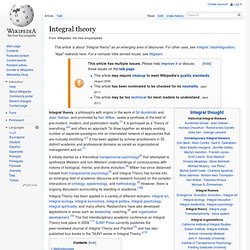
"[1] It has been applied by scholar-practitioners in 35 distinct academic and professional domains as varied as organizational management and art.[1] Methodologies[edit] AQAL, pronounced "ah-qwul," is a widely used framework in Integral Theory. It is also alternatively called the Integral Operating System (IOS) or by various other synonyms. The Rise And Fall of Ken Wilber. Ken Wilber. Kenneth Earl "Ken" Wilber II (born January 31, 1949, in Oklahoma City, Oklahoma) is an American writer and public speaker.
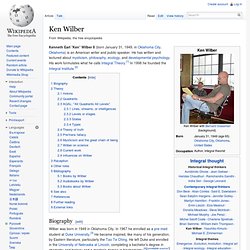
He has written and lectured about mysticism, philosophy, ecology, and developmental psychology. His work formulates what he calls Integral Theory.[1] In 1998 he founded the Integral Institute.[2] Biography[edit] Wilber was born in 1949 in Oklahoma City. In 1967 he enrolled as a pre-med student at Duke University.[3] He became inspired, like many of his generation, by Eastern literature, particularly the Tao Te Ching. In 1973 Wilber completed his first book, The Spectrum of Consciousness,[5] in which he sought to integrate knowledge from disparate fields. In 1982 New Science Library published his anthology The Holographic Paradigm and other Paradoxes[6] a collection of essays and interviews, including one by David Bohm.
In 1983 Wilber married Terry "Treya" Killam who was shortly thereafter diagnosed with breast cancer. Integral Institute. The Integral Institute is a think-tank founded in 1998 by American author Ken Wilber.
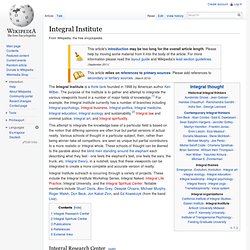
The purpose of the Institute is to gather and attempt to integrate the various viewpoints found in a number of major fields of knowledge.[1] For example, the Integral Institute currently has a number of branches including Integral psychology, Integral business, Integral politics, Integral medicine, Integral education, Integral ecology and sustainability,[2] Integral law and criminal justice, Integral art, and Integral spirituality.
This attempt to integrate the knowledge base of a particular field is based on the notion that differing opinions are often true but partial versions of actual reality. Various schools of thought in a particular subject, then, rather than being winner-take-all competitors, are seen as unique but partial contributors to a more realistic or Integral whole. Boomeritis. Boomeritis: A Novel That Will Set You Free is a polemical 2002 novel by American philosopher Ken Wilber principally designed to explain Wilber's integral theory and to explain his concept of "Boomeritis".
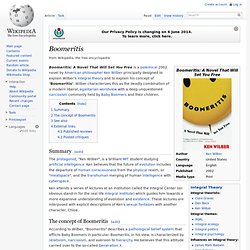
Wilber characterizes this as the deadly combination of a modern liberal, egalitarian worldview with a deep unquestioned narcissism commonly held by Baby Boomers and their children. Summary[edit] Ken attends a series of lectures at an institution called the Integral Center (an obvious stand-in for the real life Integral Institute) which guides him towards a more expansive understanding of evolution and existence. These lectures are interposed with explicit descriptions of Ken's sexual fantasies with another character, Chloe. The concept of Boomeritis[edit] According to Wilber, "Boomeritis" describes a pathological belief system that afflicts Baby Boomers in particular. See also[edit] External links[edit]
Integral psychology. Integral psychology is psychology that presents an all-encompassing holistic rather than an exclusivist or reductive approach.
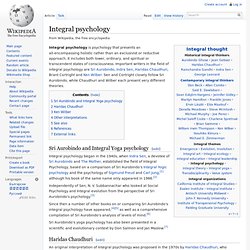
Integral. Integral... An Integral Approach to Project Management. Brad McManus & Ron Cacioppe Brad McManus Abstract Ron Cacioppe Projects are an important management approach to improving organisational effectiveness.

This paper describes how project management can contribute to achievement of an organisation’s strategy and sustainable success by adopting a more holistic, ‘integral’ approach to a project and the leadership of people during the stages of a project. A Project is ‘an individual or collaborative enterprise that is carefully planned to achieve a particular aim… To cause to move forward or outward’,Oxford Dictionary 1.0 Project Management versus the Day to Day Management of Organisations Projects management is an important management tool to implement strategy and achieve an organisation’s strategic goals. Project management differs from the day to day management of organisations. Figure 1: Stages of the Project Life Cycle (Gray and Larson, 2006) Cooke-Davies (2002) identifies several factors critical to the success of projects.